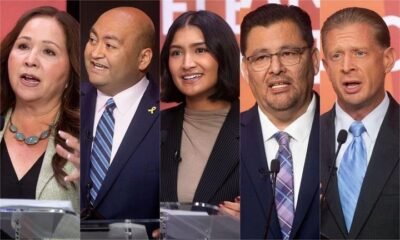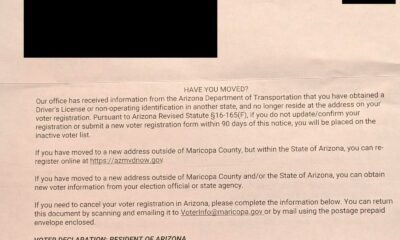2024 Election News
Number of Affected Voters from Registration Errors Skyrockets Over Twofold

Arizona’s voter registration landscape has undergone a significant transformation, with approximately 218,000 individuals registered without the necessary proof of citizenship mandated by a 2004 law, according to Secretary of State Adrian Fontes. This figure has surged from about 98,000 just a week prior.
Despite this staggering number, Fontes maintains that the Arizona Supreme Court’s recent ruling allows all affected voters to participate fully in the upcoming election. This ruling has overridden Maricopa County Recorder Stephen Richer’s arguments, which suggested that these voters should only be eligible for federal elections due to their citizenship documentation issues.
Per the Supreme Court’s decision, election officials will assess citizenship proof only after this year’s election concludes. They will determine what steps these voters must take to secure a complete ballot in future elections.
The escalating situation has prompted a response from Arizona Republican Party Chair Gina Swoboda, who criticized Fontes, saying he should immediately provide a list of affected voters to county recorders. This, she argues, would help address concerns from those questioning their registration status.
Aaron Thacker, a spokesperson for Fontes’s office, dismissed this suggestion, stating that disclosing such a list is not feasible under the current Supreme Court ruling. The court has deemed that unless due process is afforded to these voters, actions to revoke registration are prohibited.
Swoboda contests the interpretation of the court’s order but acknowledges that for the upcoming election, all individuals on the list will receive a full ballot. Nevertheless, she expresses concern regarding the fluctuating statistics, previously estimated to reach as high as 300,000, fearing it undermines public confidence in the electoral process.
The validity of election outcomes in previous years continues to be scrutinized by some, despite multiple courts affirming the accuracy of those results. Swoboda warns of a potential decline in voter participation due to growing frustration.
The root of the registration issue lies in a combination of a longstanding law and administrative complications. Arizona’s 2004 law mandates ‘documented proof of citizenship’ for voter registration, which includes a variety of accepted documents like birth certificates and passports. However, individuals obtaining driver’s licenses after 1996 are presumed to have met the citizenship requirement.
A key complication arises due to an error in the Motor Vehicle Division (MVD) records. If someone received a duplicate license or changed their address post-1996, it falsely indicated that they had acquired their license after the deadline requiring citizenship proof.
Among those potentially affected, the Secretary of State’s Office estimates that individuals at least 45 years old—typically holding pre-1996 licenses—comprise a significant portion. Notably, Republicans represent about 36% of this group, while Democrats constitute around 28%.
For individuals seeking to verify their registration status, having a Real ID can serve as an indicator—they are required to provide proof of citizenship to obtain this enhanced license. Furthermore, the public can check their voter registration on the state’s official website.
Thacker indicated that compiling a comprehensive list of questionable registrations has been ongoing. The goal is to ensure the information sent to counties is accurate and minimizes the burden on individuals needing to prove their citizenship.
County election officials are currently focused on the upcoming general election. Post-election, efforts will shift towards addressing the registration discrepancies to safeguard voter rights effectively.


















